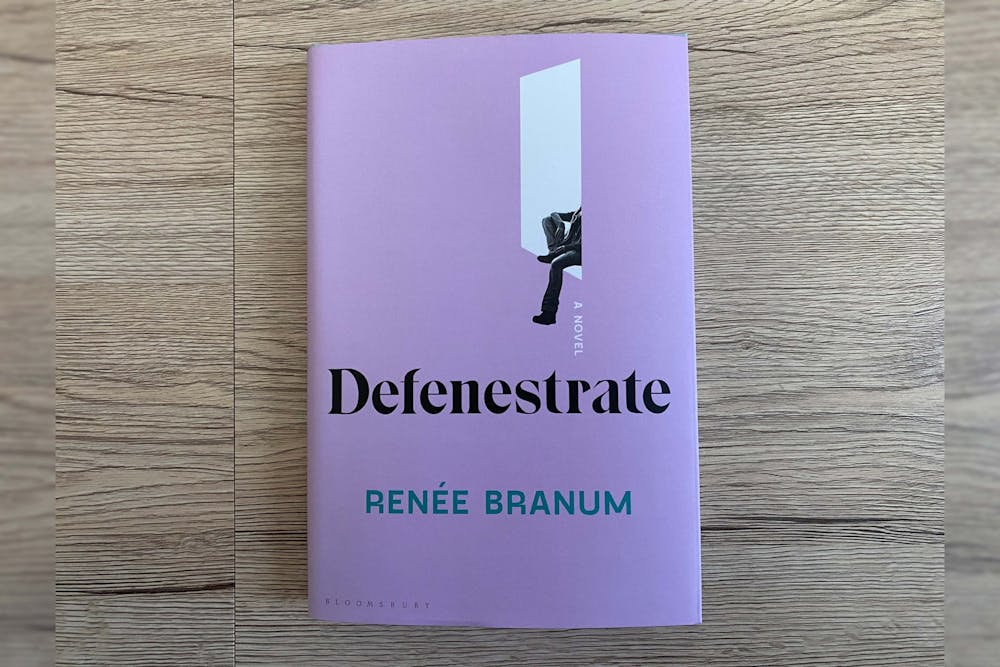Paris is known as the City of Light, Chicago as the Windy City. Rome is known for its seven hills, Florence for its lilies. My favorite urban identity, though, belongs forever to Prague, the Czech Republic, the city known for its defenestrations.
“Defenestrate” is both the title of Renée Branum’s January novel and one of my favorite English words. It means to throw someone or something out of a window, and I have always loved that this apparently occurred with enough frequency that someone decided we should have a specially delineated word to describe it.
The most-known defenestration occurred in 1618 Prague. During a religious dispute, two men were thrown out of a window 70 feet off the ground. Catholics say the men were saved by angels, possibly rescued by the Virgin Mary herself. Protestants say the men survived because they landed in a dung heap below the window.
“Looking down from that window, it is easy to imagine an angel in the expanse between sill and cobblestones,” Branum writes. “Easier still to imagine a pile of shit, and easiest of all to conclude: the city holds both of these in the loose clasp of its hand.”
Branum’s main characters trace their lineage back to a different defenestration in Prague. Marta, who narrates the 221-page story, is the great-great-granddaughter of a man named Jiří. In 1895, Jiří pushed a stonemason from a church steeple for seducing his youngest daughter.
“The belief is that the stonemason's fall has somehow been handed down through the years, that for generations our family has held on to this death and never been forgiven,” Branum writes. “You could call it a curse, but that’s a word we never seemed to use.”
After stories of lethal falls criss-cross generations, Marta and her twin brother Nick learn how to fall. They practice the most graceful way to greet the ground, analyzing Buster Keaton films like football teams watch old tapes.
Nick avoids unnecessary risks. Marta takes them.
After an epic fight between Nick and their strict Catholic mother over the existence of Nick’s boyfriend, the twins move from their Midwestern family home to their ancestral Prague.
The story jumps between time periods, primarily chronicling their time in Prague and the year of their return, during which Nick is hospitalized after surviving a five-story fall.
Each time the reader thinks they are grasping the plot’s trajectory, the point changes mid-flight, like a coin catapulting toward the ground.
Branum slides questions of identity, love, mental illness and belonging into a beautifully packaged analysis of the stories we choose to tell and how we tell them.
Marta seems equally afraid of the fall and its counterpart: surviving.
She views the local bar as a holy place and talks about wakefulness in a way showing she needs more than sleep.
Branum’s prose reminds me of the last stanza of Theodore Roethke’s poem “The Waking.” Roethke’s narrator concludes by saying, “This shaking keeps me steady. I should know. / What falls away is always. And is near. / I wake to sleep, and take my waking slow. / I learn by going where I have to go.”
Marta first believes it is Nick who is shaking. She calls their estranged mother, worried his fall was intentional. By the end, though, readers witness her realization that she is the twin who needs help.
Branum’s words are placed intentionally, crafted like a painter’s every brush stroke. She almost overuses figurative language — though her writing is graceful, once readers notice her tendency toward similes, they can’t stop noticing it.
“Defenestrate” is one of my new favorites. Branum concludes her story with a twilight scene of the twins sitting in a Prague tower.
“Even afterward, there was still a lot of good light left,” she writes.



